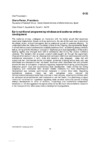Identificador persistente para citar o vincular este elemento:
https://accedacris.ulpgc.es/jspui/handle/10553/107086
| Título: | Early nutritional programming windows and seahorse embryo development | Autores/as: | Otero-Ferrer, F. Izquierdo, M. Fazeli, A. Holt, W. |
Clasificación UNESCO: | 310502 Piscicultura | Fecha de publicación: | 2015 | Conferencia: | EPICONCEPT Workshop 2015- Epigenetics and Periconception Environment | Resumen: | The seahorse embryo undergoes an interaction with the male's pouch that resembles mammalian implantation. Based on these statements, the aim of this work was to determine the effects of pre-and peri-conception diet on embryonic growth in seahorse offspring. To understand when the males exert the dietary effects on the offspring, the experimental design involved wild-sourced or commercially available seahorse diets, establishing dietary windows before, during and after the time of conception. Seahorse pairs were separated, and the male's feeding regime was changed from wild to commercial diet during the various nutritional windows. The female's diet remained constant (wild-caught) all through the experiment. Physical dimensions of 1-day old offspring from each pair's first brood were measured and the biochemical composition of both, diets and newborns also analysed. Males fed with suboptimal diet (commercial) before conception, produced offspring whose body size was abnormally low compared to wild fed males. Moreover when suboptimal diet was provided around the time of conception, it had also negatively impacted the offspring, producing poor embryonic growth rates and asynchronous body development. Males entirely fed during pregnancy with commercial diets showed smaller newborns but there morphological development was normally synchronized compared to control (Male Wild). Regarding biochemical analysis, males fed with suboptimal diets reduced the docosahexanoic/eicosapentanoic fatty acid ratio in their progeny, showing the contrary trend for eicosapentanoic/arachidonic ratio compared to wild fed males. The preliminary analysis conducted confirmed our hypothesis regarding male sensitive nutritional periods affecting embryo development in terms of biometry, morphology and biochemical composition. Moreover our results suggested that signals produced by diet could induce chemical variations in the male pouch that affect early embryo developmental programme. | URI: | https://accedacris.ulpgc.es/handle/10553/107086 | ISBN: | 978-953-8006-02-9 | Fuente: | EPICONCEPT Workshop 2015-Epigenetics and Periconception Environment, 26-29 April 2015, Dubrovnik, Croatia, Oral Presentation, p. 44 |
| Colección: | Actas de congresos |
Visitas
195
actualizado el 15-ene-2026
Descargas
37
actualizado el 15-ene-2026
Google ScholarTM
Verifica
Altmetric
Comparte
Exporta metadatos
Los elementos en ULPGC accedaCRIS están protegidos por derechos de autor con todos los derechos reservados, a menos que se indique lo contrario.
